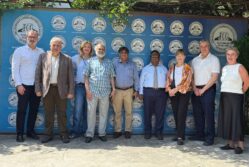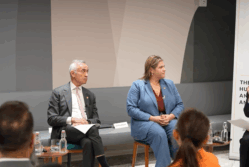Event Coverage Highlight

Jacob Kushner Discusses Resurgence of Far-right Violence in Germany in ‘Look Away’

Jacob Kushner, left, speaks with Seyward Darby at the Rizzoli Bookstore on May 9. Photo: Columbia Graduate School of Journalism
by Chad Bouchard
Before OPC member and author Jacob Kushner started research for his new book, Look Away: A True Story of Murders, Bombings, and a Far-Right Campaign to Rid Germany of Immigrants, the 1989 fall of the Berlin Wall had mostly evoked images of celebration and families reuniting in the streets.
“That sort of thing is what we saw in the West, but we didn’t see what I found in Human Rights Watch and other reports – the immediate violence against immigrants,” he said during a book night on May 9 at the Rizzoli Bookstore in Manhattan. Kushner said a spate of xenophobic attacks seemed aimed at “defining what a newly reunified Germany was, and what it wasn’t – who didn’t belong.”
On May 9, the OPC partnered with the bookstore and Grand Central Publishing for a conversation about his book, which follows breadcrumbs from the violence of the 1990s to more recent terrorist attacks by three white nationalists, exposing blind spots and racist reflexes in law enforcement that helped the terrorist cell evade police. Seyward Darby, author of Sisters in Hate, moderated.
Kushner, who won the OPC Foundation’s Nathan S. Bienstock Memorial Scholarship in 2013, said he first heard about the National Socialist Underground (NSU) group during a stay in Berlin during a journalist exchange program in 2016. The NSU is responsible for a series of murders of nine immigrants and a police officer between 2000 and 2007, as well as a spate of bank robberies and bombings. Kushner started down his years-long “rabbit hole” of research after contacting a lawyer with a group that represented the families of bombing victims.
“My interest was in how [the NSU] got away with it,” he said. The lawyer told him to dig into German intelligence agencies and the network of informants that they relied on when investigating the terrorist attacks. “You have to look not just at the police, but what these agencies in Germany – that are meant to protect Germans and Germany from existential threats and anti-democratic threats – what they failed to do.”
He said some of the informants were far-right neo-Nazis who were investing taxpayer money into right-wing groups and committing crimes while under protection from prosecution due to their status as informants.
“I learned during this research how a lot of these old habits, of over-reliance on informants, didn’t die after reunification,” Kushner said.
He noted chilling similarities between shortcomings of German law enforcement and the U.S. government’s reliance on informants in fighting far-right extremism after 9-11. Kushner cited Trevor Aaronson’s book The Terror Factory, which looks at the FBI’s strategy of entrapping people by luring them with fake terrorist plots, while ignoring far-right domestic terrorists.
He said agencies dedicated their resources to that strategy despite warnings from the U.S. Congress, two months after the 9-11 attacks, that far-right terrorism was the biggest threat to national security. Kushner added that in 2009 the Obama administration published a report indicating far-right groups were trying to recruit from the U.S. military. After public backlash, the administration retracted the report and apologized.
“Even though it was all true, and then the [Department of Homeland Security] reassigned the team to Islamist extremism instead,” he said. “We’ve known for decades who our biggest threat is. The far right commits far more violent attacks in the United States than Islamist terrorists do. They’ve killed more people since 9-11. That’s one of the takeaways that I realized is that our government is very much aware of this problem. And some in Germany say their government is absolutely aware of these problems too and haven’t done enough.”



